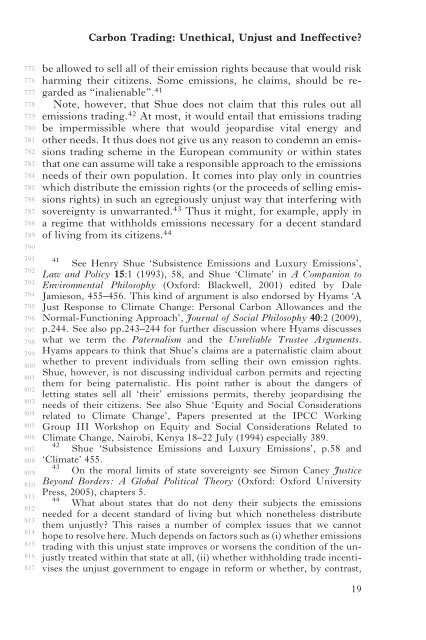Carbon Trading: Unethical, Unjust and Ineffective? - Global ...
Carbon Trading: Unethical, Unjust and Ineffective? - Global ...
Carbon Trading: Unethical, Unjust and Ineffective? - Global ...
Create successful ePaper yourself
Turn your PDF publications into a flip-book with our unique Google optimized e-Paper software.
<strong>Carbon</strong> <strong>Trading</strong>: <strong>Unethical</strong>, <strong>Unjust</strong> <strong>and</strong> <strong>Ineffective</strong>?<br />
775<br />
776<br />
777<br />
778<br />
779<br />
780<br />
781<br />
782<br />
783<br />
784<br />
785<br />
786<br />
787<br />
788<br />
789<br />
790<br />
791<br />
792<br />
793<br />
794<br />
795<br />
796<br />
797<br />
798<br />
799<br />
800<br />
801<br />
802<br />
803<br />
804<br />
805<br />
806<br />
807<br />
808<br />
809<br />
810<br />
811<br />
812<br />
813<br />
814<br />
815<br />
816<br />
817<br />
be allowed to sell all of their emission rights because that would risk<br />
harming their citizens. Some emissions, he claims, should be regarded<br />
as “inalienable”. 41<br />
Note, however, that Shue does not claim that this rules out all<br />
emissions trading. 42 At most, it would entail that emissions trading<br />
be impermissible where that would jeopardise vital energy <strong>and</strong><br />
other needs. It thus does not give us any reason to condemn an emissions<br />
trading scheme in the European community or within states<br />
that one can assume will take a responsible approach to the emissions<br />
needs of their own population. It comes into play only in countries<br />
which distribute the emission rights (or the proceeds of selling emissions<br />
rights) in such an egregiously unjust way that interfering with<br />
sovereignty is unwarranted. 43 Thus it might, for example, apply in<br />
a regime that withholds emissions necessary for a decent st<strong>and</strong>ard<br />
of living from its citizens. 44<br />
41<br />
See Henry Shue ‘Subsistence Emissions <strong>and</strong> Luxury Emissions’,<br />
Law <strong>and</strong> Policy 15:1 (1993), 58, <strong>and</strong> Shue ‘Climate’ in A Companion to<br />
Environmental Philosophy (Oxford: Blackwell, 2001) edited by Dale<br />
Jamieson, 455–456. This kind of argument is also endorsed by Hyams ‘A<br />
Just Response to Climate Change: Personal <strong>Carbon</strong> Allowances <strong>and</strong> the<br />
Normal-Functioning Approach’, Journal of Social Philosophy 40:2 (2009),<br />
p.244. See also pp.243–244 for further discussion where Hyams discusses<br />
what we term the Paternalism <strong>and</strong> the Unreliable Trustee Arguments.<br />
Hyams appears to think that Shue’s claims are a paternalistic claim about<br />
whether to prevent individuals from selling their own emission rights.<br />
Shue, however, is not discussing individual carbon permits <strong>and</strong> rejecting<br />
them for being paternalistic. His point rather is about the dangers of<br />
letting states sell all ‘their’ emissions permits, thereby jeopardising the<br />
needs of their citizens. See also Shue ‘Equity <strong>and</strong> Social Considerations<br />
related to Climate Change’, Papers presented at the IPCC Working<br />
Group III Workshop on Equity <strong>and</strong> Social Considerations Related to<br />
Climate Change, Nairobi, Kenya 18–22 July (1994) especially 389.<br />
42<br />
Shue ‘Subsistence Emissions <strong>and</strong> Luxury Emissions’, p.58 <strong>and</strong><br />
‘Climate’ 455.<br />
43<br />
On the moral limits of state sovereignty see Simon Caney Justice<br />
Beyond Borders: A <strong>Global</strong> Political Theory (Oxford: Oxford University<br />
Press, 2005), chapters 5.<br />
44<br />
What about states that do not deny their subjects the emissions<br />
needed for a decent st<strong>and</strong>ard of living but which nonetheless distribute<br />
them unjustly? This raises a number of complex issues that we cannot<br />
hope to resolve here. Much depends on factors such as (i) whether emissions<br />
trading with this unjust state improves or worsens the condition of the unjustly<br />
treated within that state at all, (ii) whether withholding trade incentivises<br />
the unjust government to engage in reform or whether, by contrast,<br />
19
















